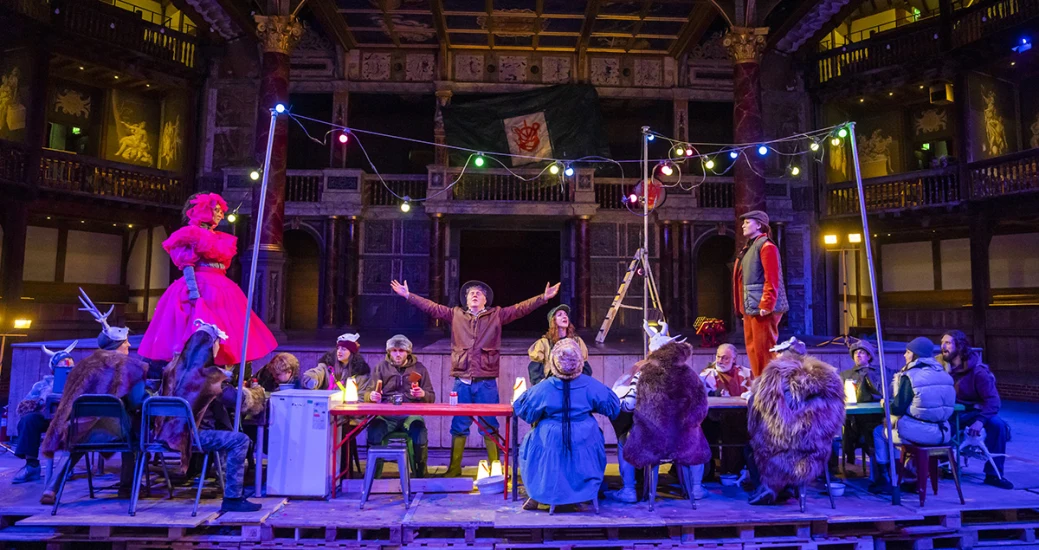'The Winter's Tale' review — Shakespeare's play is cleverly reinvented for the ages
Read our three-star review of The Winter's Tale at Shakespeare's Globe, directed by Sean Holmes. The play runs through 16 April 2023.
If invention were all, Sean Holmes’s new staging of The Winter’s Tale would be a production for the ages. Even as it is, this version for the Globe of Shakespeare’s eternally wounding late-Romance makes history is of unusual note: it’s the first production ever at this address to utilise both the Sam Wanamaker space indoors and the outdoor space which, for self-evident reasons to do with the seasonal chill, is usually closed to playgoers until late-April. Getting pneumonia isn’t a winter’s tale on anyone’s to-do list.
Holmes’s invention draws from the text. Seizing upon the bifurcated nature of a play that leaps forward 16 years on the way to its redemptive ending, Holmes has had a conceptual stroke of genius. The scenes to do with Leontes, the excitable king whose “tremor cordis” kickstarts the plot, takes place in the clearly fraught realm of Sicilia, and so those passages happen indoors.
When the action fast-forwards to the sheep-shearing festival in Bohemia, where Leontes’ long-abandoned daughter Perdita is found, Holmes relocates the audience to the alfresco environs of the Globe’s outdoor space. The two settings are visually linked by tables, the interior one as elegant as the one in the Globe yard looks deliberately gimcrack.
The Bohemia element of the play, whose forced jollity can often be quite trying, is more engaging than usual. There may not be a lot of chemistry between Jacoba Williams’s Perdita, attired in frilly, eye-catching pink, and Sarah Slimani’s rather declamatory Florizel, Polixenes’s son, who returns with Perdita in time for a final scene defined by “wonder” — the abiding leitmotif of this play.
Ed Gaughan, himself a composer, makes a genuinely funny, jaunty Autolycus, the roguish conman seen here cycling into view and quoting Fagin, from Oliver!: “you gotta pick a pocket or two.” A special shout-out, too, to Dave Williams from the Soldier’s Arts Academy ensemble who play the people of Bohemia. Williams bravely distinguishes himself as a human flame-thrower who appears bare-chested in the February chill; one can only assume the fire he wields with finesse goes some way toward keeping him warm.
Sicilia, though, must define the play, and one wishes there for performances that dug more deeply than the cast, at present, is delivering. I love the idea of Sergo Vares’s Leontes infantilised by the jealousy that overtakes him, when he mistakes his lifelong friend Polixenes’s behaviour towards the pregnant Hermione, Leontes’ wife, as a sign of betrayal.
The tall, lanky Vares at one point strips down to his underwear and curls up in foetal abjectness, becoming the very child that he will soon lose due to his aberrant behaviour. (Not for nothing does Perdita mean “the lost one”.)
Referring to his wife as a “hobby horse,” this Leontes hints at a fury beneath Vares’ bespectacled, initially gentle-seeming facade; nor does the choice of words say much about his generosity of spirit toward women.
I never felt as if I was peering into the psychic abyss demanded of a role that can be seen to extend the thematic of Othello, the other Shakespeare play to foreground jealousy, though to far more grievous results.
Bea Segura’s Hermione is emphatic to a fault but she doesn’t cut to the emotional quick, however arresting it is toward the end to find her and Leontes’ time together relived via slides that are the best Leontes can do to restore his dead wife to him. (Seeing a slide projector onstage, I realised how once-common objects these days belong to a bygone era.)
Far more intriguing is John Lightbody’s Polixenes, who after the interval tears into the smitten Perdita as “a fresh piece of excellent witchcraft” — which, as assessments of women go, is scarcely more enlightened than Leontes’s view of Hermione earlier on.
There to restore the balance, at least in part, is the redoubtable Paulina, the Sicilian noblewoman who is also the play’s de facto moral arbiter (and who, at the end, gets conjoined with the lord, Camillo, in one of the hastier pairings in all Shakespeare). The excellent Nadine Higgin brings immediate authority to this self-described “old turtle” who looks on in horror at the wreckage Leontes seems to bring with him.
It’s hilarious to see this play’s famous bear – subject of arguably the most famous stage direction (“Exit, pursued by a bear”) in all Shakespeare – cropping up multiple times, in a suit if you please, to shadow action that turns animalistic at whim. The production moment by moment is as clever as one could wish for; now it just needs to strike more directly at the heart.
The Winter's Tale is at Shakespeare's Globe through 16 April. Book The Winter's Tale tickets on London Theatre.
Photo credit: The Winter's Tale at Shakespeare's Globe (Photo by Tristram Kenton)
Originally published on

